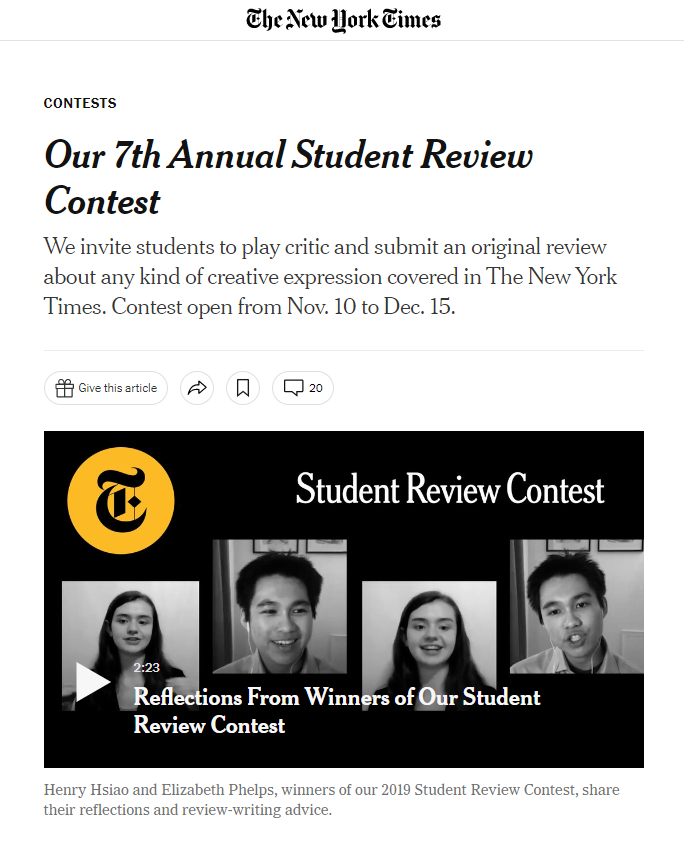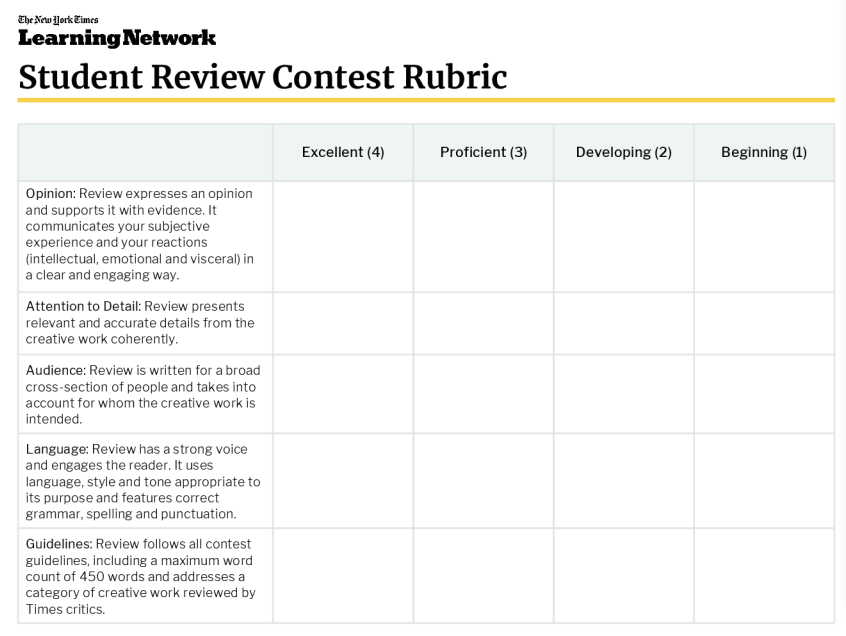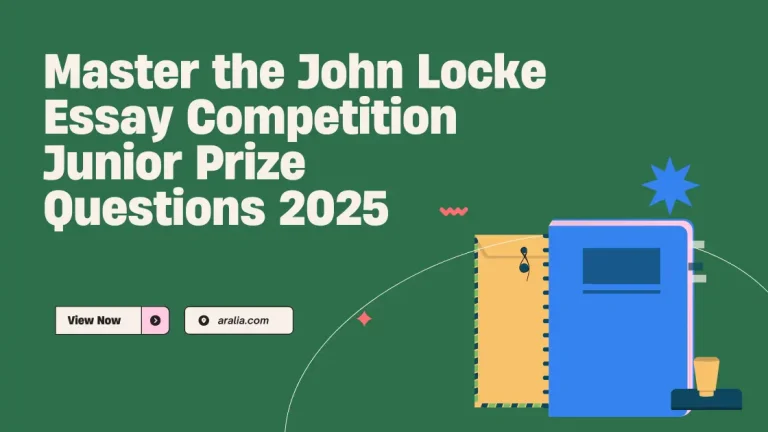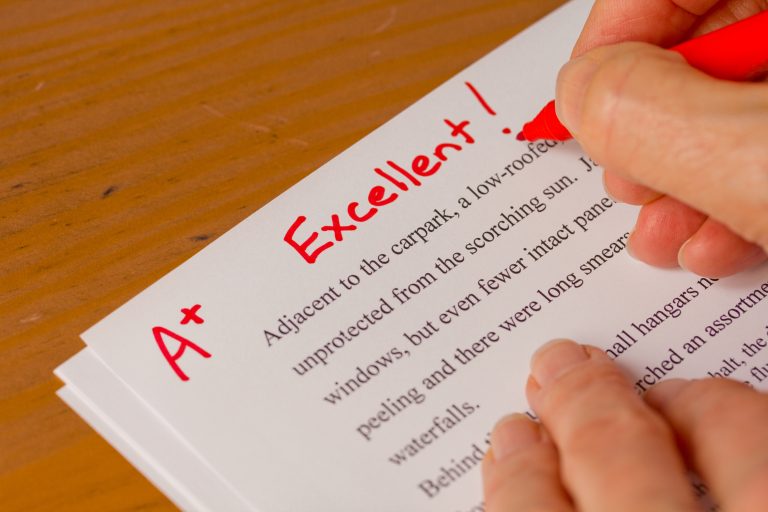对于中学生来说,提升英文写作的最快方法,就是学习优秀文章的写作技巧。一篇优秀的文章在主题设置,文章框架,行文方法以及叙事手法上都拥有其突出的地方,值得我们借鉴。
对于小作家来说,如果你喜欢对事物发表自己的想法和观点,那你非常适合纽约时报学生评论竞赛。
在纽约时报评论竞赛中,学生可以针对任何类型的创意作品进行评论,包括多类别主题。
今天我们为大家带来2021年纽约时报第七届学生评论竞赛获奖作品详细逐句分析,帮助同学们感悟获奖作品的魅力,学习优秀写作技巧,助力备赛第一步!

纽约时报学生评论竞赛评分标准

纽约时报学生评论竞赛关注到文章最终呈现的五点内容,并以此作为评分标准,分别是:
Opinion 观点
评论表达了一种观点,并以证据支持它。需要以清晰和吸引人的方式传达参赛者的主观经验及对应反应(理解力、情感和内在)。
Attention to Detail 细节
评论中需连贯地展示了创意作品中相关且准确的细节。
Audience 受众
评论是为广泛分布的人群创作的,需要考虑到创意作品的目标人群。
Language 语言
评论通过强有力的语言叙事来吸引读者。使用适合其目的的语言风格和语气,并具有正确的语法、拼写和标点符号。
Guidelines 比赛准则
评论遵循纽约时报所有的比赛准则,包括最多字数为450字,并根据《纽约时报》评论员所评论的类别进行创作。
并通过四个分值:Excellent (4); Proficient (3); Developing (2) ; Beginning (1)来进行每一项的最终评判。
竞赛评分标准是最好的文章指导和修改准则。通过对竞赛评分标准的解析,有助于参赛者掌握评委的评分偏好,有助于对自己的回复进行适当地修改。
获奖范文在满足竞赛评分标准的同时,又拥有独特的创作思路与行文风格,让我们一起来看看吧~
获奖范文逐段赏析
以下文章来自2021年纽约时报评论竞赛Winner获奖者Colin Kim参赛作品, Colin来自Groton, Mass.
“A vibrant collection of vlogs gushes over New York City’s newest attraction, the ‘floating oasis’ Little Island. An artificial skerry at the once fatigued Pier 55 right in the middle of the Hudson River, it’s new, it’s unique and it’s definitely eye-catching. It’s home to evergreen gardens, families of lush trees and even a festive amphitheater that are sure to glow up Instagram feeds. Nevertheless, it’s the exact opposite of what it’s supposed to represent. Parks are for families, for experiencing the peace and cohesion that our planet organically gifts us, values that are nowhere to be seen within the bulky belly of Little Island.”
专家解析:
文章开篇介绍了纽约市新兴地标打卡vlog热潮,紧接着加入了对这个新的地标的描述。作者运用了一系列的抽象加上具像的形容词进行结合,使读者身临其境,从而对于作者描述的地标有了更多的概念,同时也对后文中的描写埋下伏笔。
紧接着,作者用“Nevertheless”这个词汇鲜明地转折并抛出自己的观点–作者觉得此地标并没有达到应有的作用并简单阐述了理由。
“The edifice is supported by an array of plump concrete foundations the designers call ‘tulips.’ These poles are shaped in an inorganically rigid way, drawing an odd contrast with the authentic flora on the island itself, and they ultimately juggle with visual instability by precariously cramming all their mass toward their peaks. There are over a hundred of these pillars, each of which holds a unique height, a haphazard collection composing a complexly unbalanced arrangement. It is difficult to see that such visual clutter was designed with visitors in mind, contrary to the claims of Barry Diller, the developer, who hoped to ‘see people being really happy.’ Whilst the novel structure may capture attention at first, it simply doesn’t fit with the aesthetic of a ‘park,’ in which familiar comfort should embrace each and every passing family. In the colorful district dubbed the ‘Playground,’ no swings, seesaws nor jungle gyms are in sight, and no dogs skip around the designer furniture.”
专家解析:
本段讲述了作者对于地标形态结构的分析,作者的选词非常精妙,通过比喻的修辞手法将整个建筑的构造更细节地形容给读者。并且在描述后紧跟着阐述了自己的看法“Little Island这个建筑复杂的结构其实安排的不合理”。
作者直接引用了设计者的原话“建筑违背了设计者Barry Diller的初衷”,这一信息展更有力地支持了作者的观点。本段最后的描述与上一段末尾相呼应。
“The ironic juxtaposition of a man-made structure that roots off the natural landscape demonstrates how Little Island accomplishes its goal in the least organic way possible. Even the Ancient Greeks warned us not to mess with nature: They passed down the stories of Phaethon, who grabbed the sun chariot from the gods, then proceeded to nearly burn and freeze the Earth simultaneously. Like Phaethon’s disorderly driving routes did to our planet, Little Island intrudes into the scenery of our Hudson River with a dizzying assortment of man-made tourist attractions. The pavement pushes us through predetermined pathways and separates us from freely exploring the greenery. It’s all very jarring: The image of the mega-rich throwing around obscene sums of money to lure in the blindly joyous masses with a contrived projection of ‘nature’ could have been pulled straight from a dystopian screenplay.”
专家解析:
本段中,作者巧妙地从寓意上引入古典学中“维护自然”这个概念,更进一步支撑自己的观点。
同时阐述了除了外观上的“不平衡”外,此地标对于周围的环境来说也产生了不便性。上一段的关于地标本身的描述加上本段对于外部的论证使得文章更有说服力。
“Little Island, much like an untouchable contemporary art piece at the nearby Whitney Museum, is the most alluring from afar. Up close, it’s an unfriendly extrapolation of the ideas of its self-conscious creators, not a resort for New York City and its families.”
专家解析:
最终的结尾段作者用简短精炼的语言重申了自己的观点。
范文总结
纽约时报官方给出的评分标准中包含:Opinion 观点、Attention to Detail 细节、Audience 受众群体、Language 语言、以及Guidelines 比赛准则。
作者选取的是15个写作类别中Architecture建筑的类别。文章大致讲述了他对于纽约哈德逊河上新建筑的看法。本篇文章将时事与自己的论点相结合,十分符合组委会关于题材必须要“新”且“亲身经历”的要求。
作者开篇运用了让步的写法引出大众对于新建筑的兴趣,之后转折阐述自己的观点。后续两段分别从不同的角度剖析并加强论证。在文章中,作者不仅使用了数字形容、通过直接引用和转述文献,使整篇作品信息“丰富”且有深度。
以上就是去年的纽约时报学生评论竞赛的获奖范文解析,《纽约时报》全年拥有各类型写作竞赛,适合初高中生参与。










